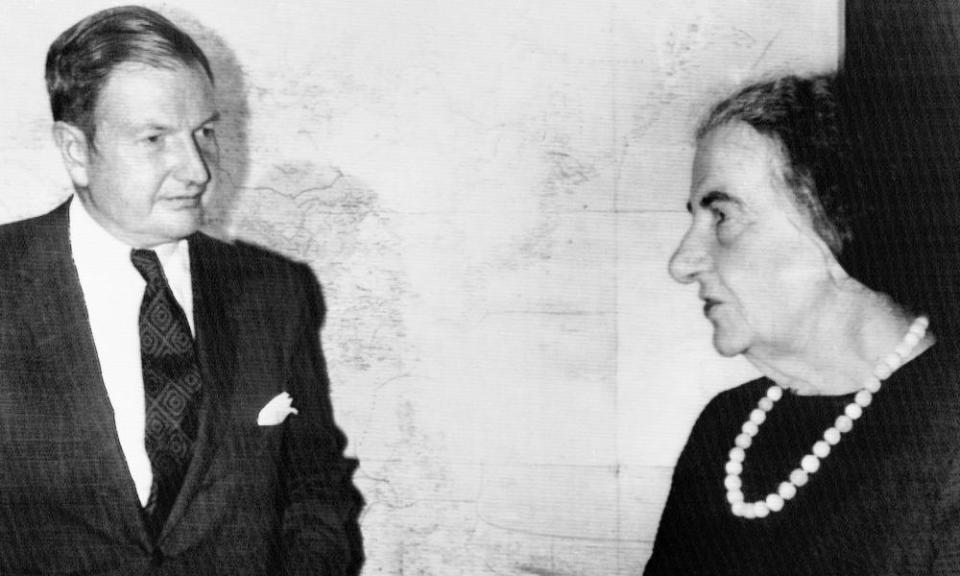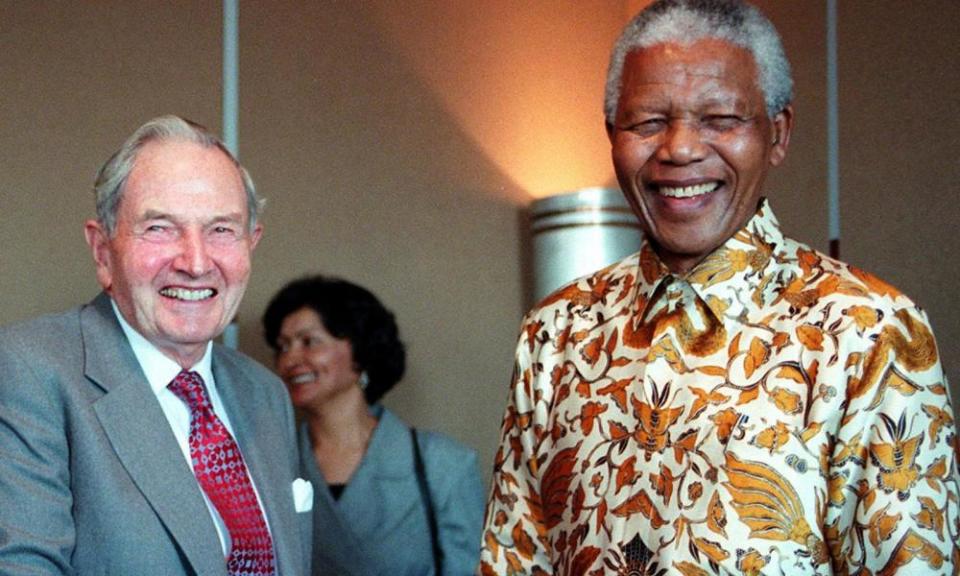David Rockefeller obituary

David Rockefeller, who has died aged 101, was the patriarch of the Rockefeller family and the last of the grandchildren of John D Rocke- feller, who founded Standard Oil and as the US’s first billionaire was at one point considered the world’s richest man.
Unlike his brothers Nelson, vice-president of the US and governor of New York, or Winthrop, governor of Arkansas, David never sought public office; indeed he even turned down Nelson’s offer to appoint him to fill Robert Kennedy’s Senate seat after Kennedy was assassinated.
However, he may have been a more powerful influence on world affairs from his position as a businessman, the long-time chairman of Chase Manhattan bank. He encouraged international engagement and became the first director of the thinktank set up by the Council on Foreign Relations thinktank (CFR) and founder of the Trilateral Commission, created in 1973 to bring together private sector leaders to discuss issues of global concern. He was also one of the US’s leading philanthropists, particularly with New York’s Museum of Modern Art, which his mother, Abigail, had helped to found.

Born to a life of privilege, David was the son of John D Rockefeller Jr and Abigail Aldrich, the daughter of the Rhode Island senator Nelson Aldrich. David grew up on Park Avenue, in New York’s tallest private residence, and on family estates, most notably Kykuit, whose 3,400 acres included most of Pocantico Hills on the Hudson River north of New York, where he developed a love of nature that later led him to assemble one of the great collections of beetles.
He attended John Dewey’s experimental New Lincoln school in New York City and graduated from Harvard. After a year at the London School of Economics, where he was friendly with John F Kennedy and dated his sister, Kathleen, he took a PhD in economics at the University of Chicago, and went to work as secretary to New York’s Republican mayor Fiorello La Guardia. In 1940 he married Margaret McGrath, whom he had first met at a dance at New York’s exclusive Chapin school many years before.
After serving as an intelligence officer during the second world war, in 1946 he started as an assistant manager in foreign trade at Chase bank, whose chairman was his uncle Winthrop Aldrich. It was in effect the family bank, with close ties to Standard Oil, which became Esso and later Exxon. At the same time he became a director of the CFR, founded by advisers to President Woodrow Wilson in the wake of the first world war, and also joined the board of the Carnegie Endowment for International Peace.

Rockefeller became president and co-chief executive officer of what was then Chase Manhattan in 1961, and sole chief executive in 1969, steering the bank towards expansion overseas, which saw its growth slow down. He also played a vital part in the rescue of the city of New York, whose bonds were a key Chase holding, after the city’s financial meltdown in the 1970s. By the time he stepped down as chairman in 1981, the bank’s profits had doubled. In 1985 the Rockefeller Centre, the huge New York office complex built by his father, was mortgaged for $1.3bn, giving the family a $300m influx in cash. Four years later they sold 51% of the centre to the Mitsubishi Estate Company, but when the Japanese property bubble burst, the centre stood on the brink of bankruptcy. Rockefeller organised a group to buy it back, and in 2000 sold it to a local developer for $1.85bn.
He broke new ground by taking Chase into the Soviet Union, China and Egypt, and sought influence abroad via advisory groups aimed at a wide growth of American influence, rather than a narrow focus on his own companies’ profits. His influence was huge: Henry Kissinger worked for the CFR on nuclear policy before becoming an adviser to presidents; when Rockefeller started the Trilateral Commission, his first director was Zbigniew Brzezinski, who became President Jimmy Carter’s Kissinger. It was Rockefeller who was crucial in persuading Carter to admit the deposed Shah of Iran to the US for cancer treatment, a move that eventually precipitated the Iran crisis that helped bring down the Carter presidency.
Rockefeller maintained close ties to the intelligence community; he was one of the “Old Boys” whose family and business connections in New York lay at the core of that world. During the second world war, Allen Dulles’s early headquarters for the Office of Strategic Services, forerunner of the CIA, was in the Rockefeller Centre; Dulles’s brother, John, was a Rockefeller in-law, and served as Eisenhower’s secretary of state while Allen ran the CIA. David Rockefeller was placed at the centre of numerous conspiracy theories; for example, when John J McCloy was appointed to the Warren Commission on the assassination of President John F Kennedy, it was noted he had been chairman of both Chase and the CFR.
In 1968, David and Nelson, along with the CBS (Columbia Broadcasting System) chief William Paley, bought Gertrude Stein’s art collection, and like most of his own collection it went on permanent loan to the Museum of Modern Art. The other major beneficiaries of his philanthropy were the Rockefeller Brothers Fund, founded in 1940 distinct from the Rockefeller Foundation and aimed at fostering social change, and Rockefeller University, started by his grandfather, one of the world’s leading medical research institutions.
In 2002 David became the first, and to date only, Rockefeller to publish his memoirs. His personal wealth was estimated at $3.3bn. Margaret died in 1996. He is survived by a son, David Jr, and four daughters, Abby, Neva, Margaret, and Eileen. Another son, Richard, who had been chairman of the Brothers Fund, died in 2014.
• David Rockefeller, businessman and philanthropist, born 12 June 1915; died 20 March 2017

 Yahoo News
Yahoo News 
